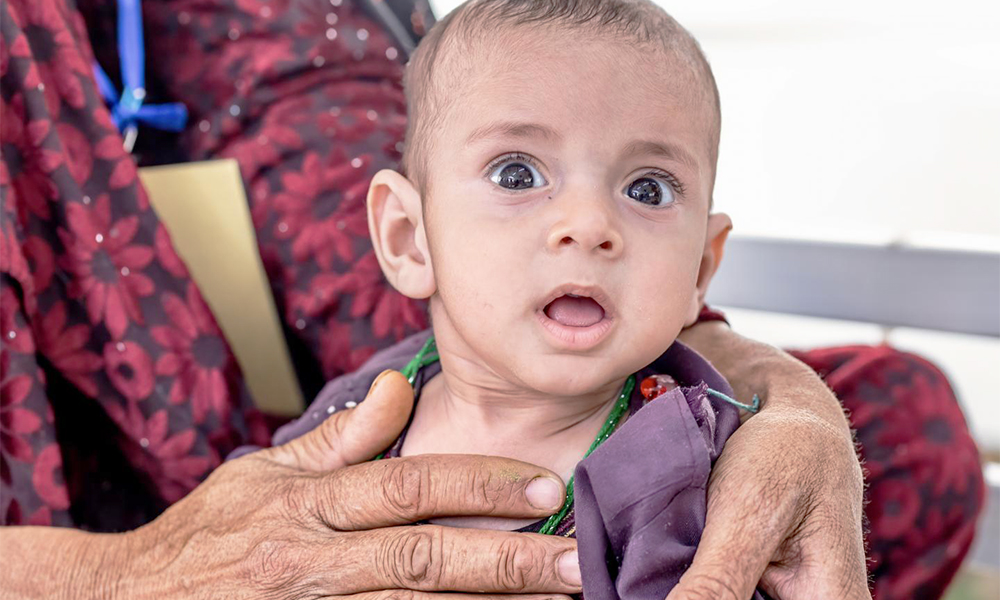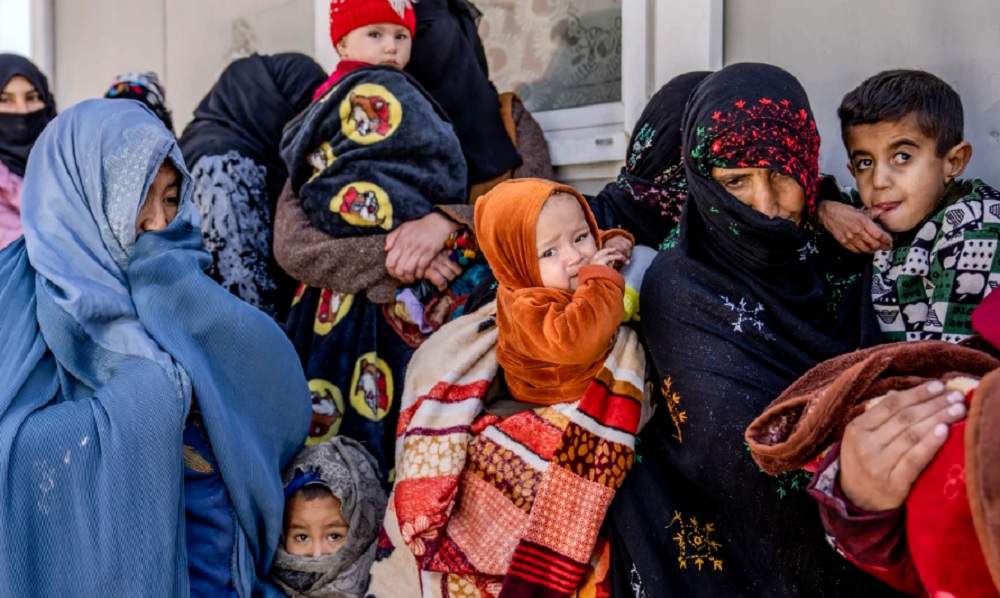Health
Child malnutrition cases rise nearly 50% in Afghanistan as hunger hits record levels

The number of dangerously malnourished children admitted to Save the Children’s mobile health clinics in Afghanistan has increased by 47% since January this year, with some babies dying before managing to receive any treatment, the children’s charity said on Monday.
Demand for malnutrition treatment services has surged in recent months as families struggle to cope with Afghanistan’s worst hunger crisis on record.
In January, Save the Children’s 57 mobile health teams admitted about 2,500 malnourished children for treatment. By September, that number had jumped to around 4,270 children admitted by 66 teams, according to newly released data.
Save the Children’s Country Director in Afghanistan, Chris Nyamandi, said:“Humanitarian organizations like Save the Children are stretched to the absolute limit trying to stop children dying from hunger every day in Afghanistan. But the truth is, with so many children facing life-threatening levels of hunger, we simply do not have the resources to save them all.
“Every day we’re faced with the heart-wrenching decision – which children do we save? It’s outrageous and horrifying to think that international leaders have the power to save these children’s lives – by working to solve the economic crisis and reinstating humanitarian funding and long-term development assistance that was withdrawn when the Taliban (IEA) retook control – but they have been too slow to find solutions and now children are dying as a result.
“Humanitarian organizations have been sounding the alarm on Afghanistan for more than a year now. It’s time the world stopped ignoring this catastrophic crisis and took action before many more children lose their lives.”
Experts had hoped to see a drop in hunger levels in Afghanistan during the recent summer harvest season, but the ongoing drought has led to failed crops and harvests have been much smaller than normal, forcing many rural families to sell land and livestock to buy food to feed their children.
The other major driver of the food crisis – the collapse of the country’s economy – has caused unemployment, poverty and food prices to skyrocket, with many families now only surviving on bread and water for weeks at a time.
Humanitarian organizations have provided vast amounts of life-saving food, but the needs are so high that 50% of Afghanistan’s population is still facing extreme hunger, with 6 million children and adults – nearly one eighth of the population – one step away from famine, the organization reported.
Save the Children doctors say they are overwhelmed with malnourished children – especially young girls who are often deprioritised.
Since the Islamic Emirate of Afghanistan (IEA) regained control in August 2021, Save the Children has scaled up its response to support the increasing number of children in need and is delivering health, nutrition, education, child protection, shelter, water, sanitation and hygiene and food security and livelihoods support.
Save the Children has reached more than 3.3 million people, including 1.8 million children since September 2021.
Health
Balkh health officials report sharp increase in number of cancer patients

Balkh Public Health Department officials say there has been a significant increase in the number of patients with cancer in the province.
“In 1401, about 2,613 OPD (out patient department) cases were registered with us. In 1402, these figures were 4,912 cases,” said Ehsanullah Kaliwal, the head of the oncology department at Balkh Regional Hospital.
Some doctors say genetic factors, environmental pollution, arbitrary use of medicines, and excessive consumption of meat were reasons for the sharp increase.
One doctor said cancer was also hereditry.
However, a large percentage of cancer patients in Balkh have stomach cancer. Many of them have appealed for the government to improve treatment facilities.
According to health officials, in the first month of this solar year (April), 423 cancer patients visited this hospital for treatment.
Health
Majority of Afghans with mental disorders are women: officials

Based on last year’s data, 52 percent of people with mental disorders in Afghanistan are women, the Ministry of Public Health said.
However, after the Islamic Emirate took over the country and with the improvement of nationwide security and the provision of better health services, mental disorders have decreased, the ministry said.
“Overall, the mental security of men and women in Afghanistan is not ensured and their mental security is disturbed. According to the figures shared with us, in 2023, 52 percent of the visitors for mental disorders were women,” said Sharaft Zaman Amarkhil, the spokesperson of the Ministry of Public Health.
“Generally speaking, we can say that compared to the past, the instances of mental illnesses have decreased,” he added.
People suffering mental disorders mostly refuse to share their problem, willingly or unwillingly.
“There are many problems at home; We are poor. I finished school, but didn’t find any job,” Ansar, a mentally ill person, said.
According to the World Health Organization (WHO), half of Afghanistan’s population suffers from mental distress.
Factors such as unemployment, poverty, domestic violence, ban on girls’ and women’s education and work, and drugs are said to be key contributors to mental distress.
Health
Over 1 million women in Afghanistan malnourished last year: WFP

A total of 1.2 million women in Afghanistan were malnourished last year, the U.N. World Food Programme (WFP) said on Thursday.
Mona Shaikh, head of nutrition at WFP Afghanistan, said that the number of malnourished women is expected to increase this year.
On malnourished children, she said that their number will reach 3 million this year, but WFP will be able to assist only 1.6 million of them.
WFP warned that after foreign assistance cuts last year, it saw a rise in children’s admissions to malnutrition clinics in Afghanistan.
More than 23 million people are in need of humanitarian assistance in Afghanistan this year, according to the United Nations. Over half of them are children.
-

 Sport4 days ago
Sport4 days agoACL fever grows as fixtures finalized
-

 World4 days ago
World4 days agoUS will not take part in any Israeli retaliatory action against Iran
-

 Latest News4 days ago
Latest News4 days agoOver 50 people dead in traffic accidents over Eid
-

 Latest News4 days ago
Latest News4 days agoUS identifies Kabul airport suicide bomber
-

 Latest News4 days ago
Latest News4 days agoGood rains enable DABS to increase power production in Kabul
-

 Business4 days ago
Business4 days agoAfghanistan-Kazakhstan chamber of commerce opens in Herat
-

 World3 days ago
World3 days agoIsraeli military vows response to Iran attack as calls for restraint mount
-

 Latest News3 days ago
Latest News3 days agoPakistani police give Afghans in Balochistan one day to leave
























